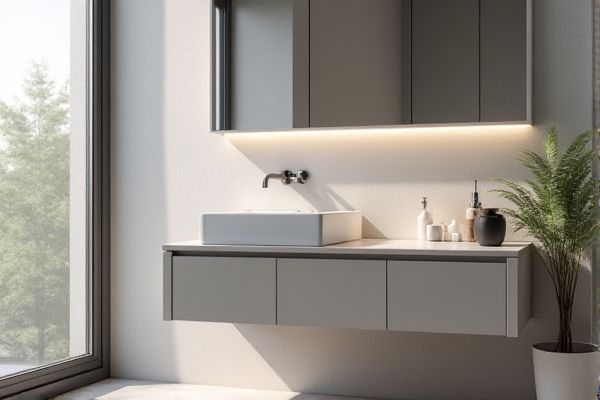
Wall-mounted sinks save valuable bathroom floor space and create a modern, minimalist look, while pedestal sinks offer a classic, elegant design with hidden plumbing but less storage options. Explore the detailed comparison to determine which sink style best suits your bathroom layout and personal preferences.
Table of Comparison
| Feature | Wall-Mounted Sink | Pedestal Sink |
|---|---|---|
| Installation | Mounted directly on the wall; requires strong wall support | Freestanding; base supports the sink weight |
| Space-Saving | Excellent for small bathrooms; clears floor space | Moderate; pedestal occupies floor area |
| Storage | Limited; no built-in storage | No storage; pedestal hides plumbing |
| Style | Modern, minimalist look | Classic, traditional appearance |
| Cleaning | Easy floor cleaning; exposed plumbing | Harder to clean base; plumbing concealed |
| Cost | Typically higher installation cost | Generally lower installation cost |
| Durability | Depends on wall structure; risk of loosening | Stable and sturdy base support |
Introduction to Wall-Mounted and Pedestal Sinks
Wall-mounted sinks are attached directly to the bathroom wall, saving floor space and offering a minimalist design ideal for small bathrooms. Pedestal sinks consist of a basin supported by a single column, creating a traditional appearance while concealing plumbing underneath. Both types provide functional options for bathroom design, with wall-mounted sinks emphasizing space efficiency and pedestal sinks enhancing aesthetic appeal.
Design and Aesthetic Differences
Wall-mounted sinks offer a sleek, modern design by freeing up floor space and creating a minimalist look ideal for contemporary bathrooms. Pedestal sinks feature a classic, sculptural aesthetic with a column that conceals plumbing, providing a traditional and elegant style. The choice between wall-mounted and pedestal sinks significantly impacts the bathroom's visual appeal and sense of openness.
Space-Saving and Functionality
Wall-mounted sinks maximize floor space by attaching directly to the wall, making them ideal for small bathrooms and enhancing accessibility. Pedestal sinks offer a compact footprint with a stylish base, but may limit storage options compared to wall-mounted models. Choosing between the two depends on the balance of space-saving needs and desired functionality, such as ease of cleaning and storage availability.
Installation Requirements and Complexity
Wall-mounted sinks require secure wall studs or reinforced backing for proper installation, making the process more complex and demanding precise plumbing alignment. Pedestal sinks, although also requiring stable floor support, generally involve simpler installation with fewer structural modifications, as their pedestal conceals plumbing and supports the basin. Your choice should consider the available wall structure and desired ease of installation to ensure a functional and aesthetically pleasing bathroom setup.
Durability and Maintenance
Wall-mounted sinks offer enhanced durability due to their sturdy attachment to the wall, minimizing the risk of damage from floor moisture or impacts common in pedestal sinks. Maintenance is simplified with wall-mounted models as their exposed plumbing facilitates easy access for repairs and cleaning, reducing long-term upkeep costs. Pedestal sinks, while aesthetically pleasing, often require more frequent maintenance due to concealed plumbing that can be harder to inspect and prone to moisture damage over time.
Accessibility and Ergonomics
Wall-mounted sinks offer superior accessibility by providing open space underneath, making them ideal for wheelchair users and ensuring easier legroom for seated individuals. Pedestal sinks, while stylish, can restrict wheelchair access due to the supporting column and may limit ergonomic positioning for users with mobility challenges. Choosing between the two depends largely on the need for universal design principles that prioritize ease of use and comfort in bathroom environments.
Storage and Under-Sink Space
Wall-mounted sinks maximize under-sink space, providing open floor area ideal for adding custom storage solutions or easy cleaning. Pedestal sinks offer limited storage as the pedestal base occupies much of the space beneath, restricting room for cabinets or shelves. Choosing a wall-mounted sink can enhance your bathroom's functionality by allowing versatile storage options and maintaining a spacious feel.
Cost Comparison and Pricing
Wall-mounted sinks generally cost less due to simpler installation and lower material use, with prices ranging from $100 to $500, making them a budget-friendly option for small spaces. Pedestal sinks, priced between $200 and $800, tend to have higher installation expenses because of more complex plumbing and support requirements. Your choice depends on balancing upfront costs with long-term design preferences and bathroom layout constraints.
Popular Styles and Trends
Wall-mounted sinks are increasingly popular in modern and minimalist bathroom designs due to their sleek, space-saving profile and ease of cleaning underneath. Pedestal sinks remain a classic choice, favored for traditional or vintage-inspired spaces, offering an elegant, sculptural look that complements detailed tile work and antique fixtures. Your decision between these styles can enhance the overall aesthetic, balancing contemporary trends with timeless appeal.
Choosing the Right Sink for Your Bathroom
Wall-mounted sinks maximize floor space and create a minimalist look, ideal for small or modern bathrooms, while pedestal sinks offer a classic aesthetic with hidden plumbing but require more floor space. Your choice depends on bathroom size, storage needs, and design preferences; wall-mounted sinks provide easy cleaning and accessibility, whereas pedestal sinks combine style with a freestanding elegance. Consider the layout and functionality to select the sink that best complements your bathroom's overall design and usability.
 homyna.com
homyna.com